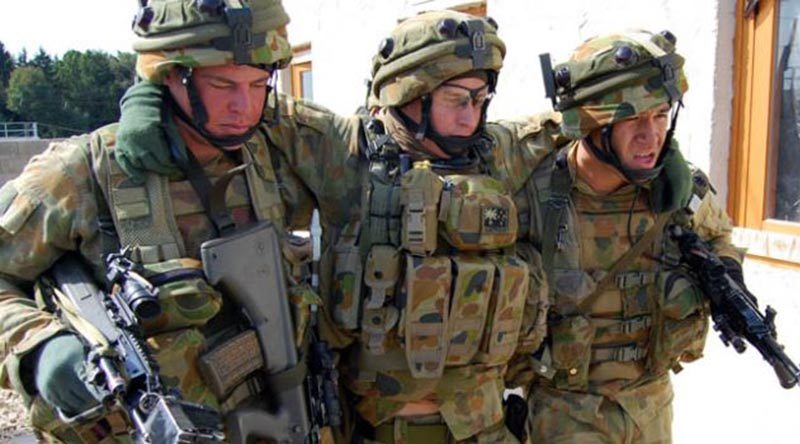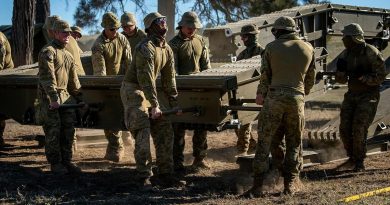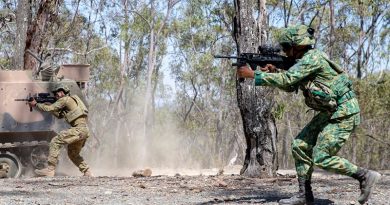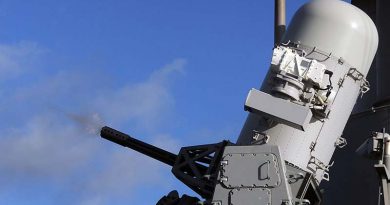Seventh annual wounded, injured and ill digger forum
Share the post "Seventh annual wounded, injured and ill digger forum"

Army’s efforts to support wounded and ill soldiers to return to work would provide valuable lessons for the Australian community, Minister for Defence Personnel Dan Tehan told a conference today.
The 2016 Chief of Army Wounded, Injured and Ill Digger Forum in Canberra today focused on rehabilitation and return to work, with particular emphasis on improving support and services to empower individuals and their families to lead their own recovery journey.
Mr Tehan said the forum reinforced the Army’s commitment to supporting its wounded, injured and ill soldiers.
“This event reflects Army’s ongoing support to its members who have been wounded, injured or become ill during service, and its determination to retain members through strong rehabilitation and retention practices,” he said.
“It is important that all levels of the army can come together and discuss how we can better support our wounded and ill personnel to help them recover and continue to make a contribution to the ADF.
“Activities such as the Wounded, Injured and Ill Digger Forum contribute to the ongoing development and refinement of Army’s support for members and their families.
“The best practice developed by Army can help other organisations improve how they get their injured and sick people back to work.”
The forum is part of the Army’s Support to Wounded, Injured and Ill Program which was established in 2008 to meet the needs of personnel returning from operational deployments in East Timor, Iraq and Afghanistan.
Further information about Army’s Support to Wounded, Injured and Ill Program is available at the following link: http://www.army.gov.au/Army-life/Wounded-Injured-and-Ill-Digger
I’m not sure how I feel about this story.
On the one hand, the Chief of Army Wounded, Injured and Ill Digger Forum is a commendable concept and the theory/aspiration to “empower individuals and their families to lead their own recovery journey” is awesome.
But, in my observation, the theory isn’t always put into practice.
As recently as two months ago, I witnessed a senior soldier discharged on mental-health grounds because some beauraucrat (who never met or interviewed the soldier) said he should be turfed out – against the member’s wishes and despite the fact he was in a position of responsibility and doing it very competently.
I freely admit there may be more to this man’s story than I am aware of.
Nonetheless, my observations from afar on this matter do not uphold the spin or the theory of this story.
What do you think?
Brian Hartigan
Editor
.
.
.
.
.
.
.
.

.
.
Share the post "Seventh annual wounded, injured and ill digger forum"







I have a combat injury – kicked from a Huey by Yank side gunner, when we were ‘over-loaded’ on leaving an Op.
I hit the deck – not sure from what height, as I was caught by surprise – while wearing a radio set, etc.
When I recovered, I looked around to see the ‘last chopper out of Dodge’ disappearing towards the horizon – while wondering which direction to head to get back to base. It then dawned on me to check if the radio still worked – just in time to see a distant gunship swing around and head back to my location.
It came in with all guns blazing to where I could be clearly seen – it hit the deck – and I threw myself to the floor – as we took off – all in about 1.5 seconds. I was dragged in, face against the deck, and just remained there until we returned to the Yank base at Bien Hoa.
The Aussie base, however, was some distance away – and as no one seemed interested in giving me a lift, I headed off in the general direction.
It may have been a couple of kms – I had no idea, but then I began to feel the back aching.
I made it back – and remember nothing more. But years later saw a photo of me arriving back – all equipment dropped off – with a big smile on my face – and others around me, also smiling. Apparently relieved.
But nothing after that – I don’t know if it became part of an ‘after action report’. But I have no memory of the back injury being treated.
Later it became agonising to continue with the radio & other equipment – especially if I had to turn suddenly to communicate with others around me back on Ops.
As radio operators were a favoured target for enemy snipers, etc I distinctly remember one occasion when we had crossed an open, dry padi – and our forward scout had gone down a sloping jungle ‘hill’ in the middle of the padi – when a child yelling caught the attention of the first 5 or 6 of us as we emerged into the open.
Whether he was a ‘watcher’/ cockatoo or not, I have no idea – but automatically I swung my rifle round in his direction – when a deep voice in front from another ‘hill’ called to him to go back to the village. I judged the voice as being about 200 metres slightly to my left but up high – and immediately realised I could easily be ‘a target’
– at the same that I WAS.
A bullet BUZZED past my ear, as I painfully dropped to the deck, then rolled to my left.
Straight into a low green ant’s nest – who liked the taste of me and began biting into my neck.
I threw dignity to the wind and began rolling along the ground to get away from where I landed – which was not easy with all the equipment/ radio/ green ants munching/ and my back aching.
Somehow we all managed to come out unscathed, as another platoon came around behind the enemy and drove them off, while calling down artillery.
I stayed as a radio operator until the tour was over. But with no recollection of any treatment – with the thought, also, that I ran the risk of being RTA – so must have played ‘the game’ of ‘just a flesh wound, Sgt’.
But civvy life brought it back with a vengeance – and I have had some episodes of extreme pain, while refusing any ‘dangerous’ medications except for one – that had me feeling as if I was floating 30 cm off the floor. It continues to this day – but I’ve lived with it for over 5 decades, untreated by dva, and being aggressively told by one of ‘their’ specialists that HE would determine if it warranted ‘treatment’ – and it proved to be ‘all in my head’.
Silly me -wasting the ‘expert’s’ time like that – I felt a real goose.
I am of similar belief. I served 1981-2001 in the ARA. I was presented to a MECRB in 2000, with supporting documentation for my retention as I was a Force Developer and had specialist skill sets in the position and wanted to AWOCS to CAPT. The result of the MECRB was via signal and I was given 6 weeks to get out after 19.5 years service to the ARA, however I was able to fight that decision to stay in for my 20 years, but told not a day over. I personally believe that I would have kept my self-esteem pride, sense of worth and contributed, had I not been tossed out like a broken robot.
The matter exacerbated pre-existing PTSD and I developed Major Depressive Disorder as a result of being forced out after 20 years service.
The job I was doing was improving Army Capability in a technical Operating Space in Training & Develpment.
It has taken a long time to no longer grieve my discharge. Basically the army broke my heart after deploying 4 times and giving 110% every day and giving me the confidence that I enjoyed in soldiering. It was the case of “MEC4, there’s the door”. As a result, my journey has now made me a financial burden to the Government by being TPI. I take every day as it comes. I have some good days, plenty of bad ones.
The Army had a cruel policy with the MEC4, and made no effort whatsoever to Rehabilitate, Retrain or Retain me. It makes it very difficult to forgive such a system that I was loyal toward for 20 years.
Thanks for sharing Paul. I fully agree it was a cruel system back then and, while it is better today, there is still much room for improvement.
I know how you feel as the same thing happened to me.
In respect to injured service people if their injury will allow them to remain in the service then let them stay. There is one example of Douglas Bader who was allowed to remain and whilst he may have been a pain in many ways that sometimes is what the services need.
I lost the job I loved in more than anything in 1974 because our Prime Minister selected a date as the criteria for discharge rather than capability or potential. Politicians so often speak of how service persons should be treated but rarely, if ever, follow their line. We should treat service personnel as someone special all the time. They are the only persons who are prepared to give their lives for this country so don’t they deserve the best
Nice comment John. I agree with you – our serving men and women do deserve the best – or at the very least, better than they often get.
It’s interesting to hear about the discharge policy back in the ’70s.
‘Back in my day’ (1990 to 2002) the official policy was, “if you aren’t front-line deployable, you’re out”. That was a cruel, heartless policy, which I’m pleased to say is history (for now at least).
The current policy goes something along the lines, “if you’re broken, we’ll do everything to fix you – if you’re so broken you can’t go back to your old job, we’ll find you a new job – or if you’re so broken we can’t employ you anywhere, we’ll help you transition to civvie street”.
However, as I said in my comments above, the theory doesn’t always fit reality. And, dare I say it, it’s those people with unseen wounds who are being treated differently/worse than those with physical wounds. Lose a leg or an arm – no worries. Lose some ‘marbles’ – you’re on very thin ice.